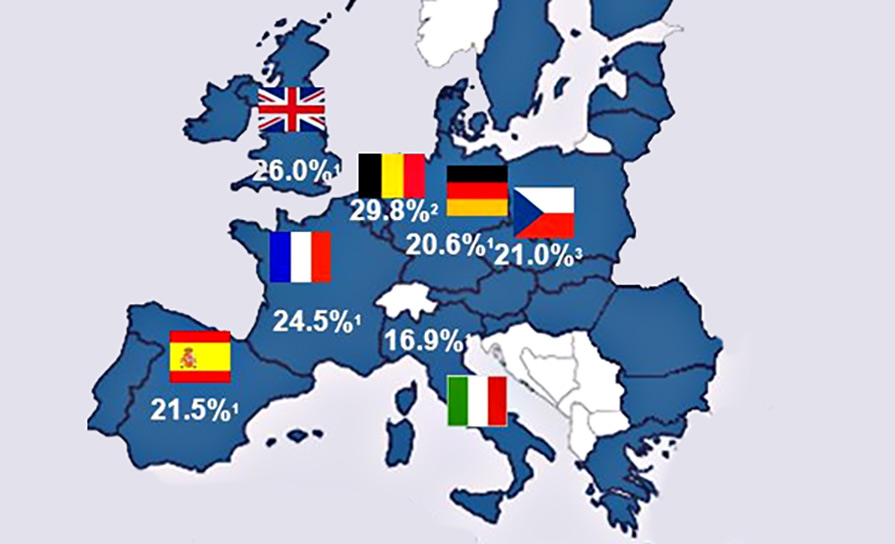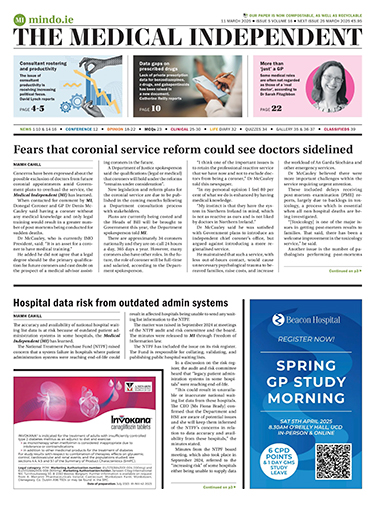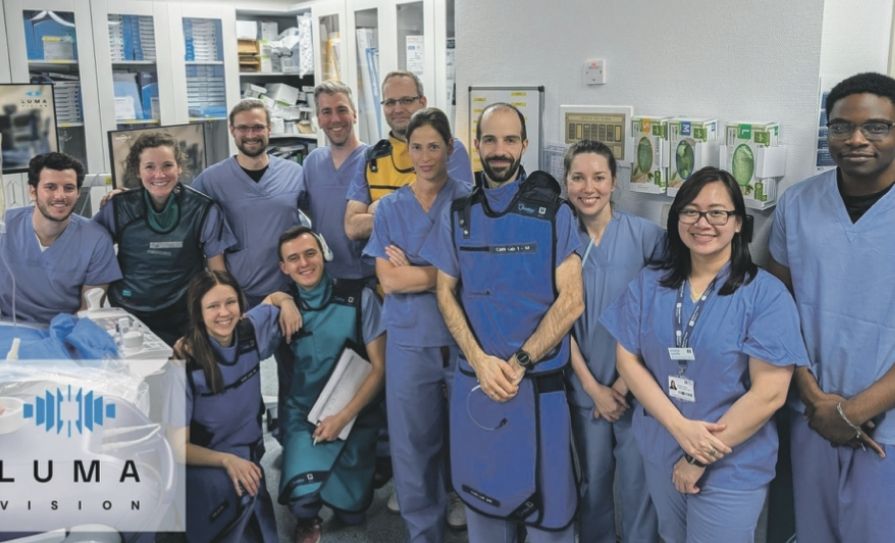Ms Michelle Tait on the need to find the hidden cohort of Irish people with hepatitis C
The management of hepatitis C has changed significantly since its discovery just over 30 years ago. From having no treatment for the disease, to the development of the first generation of interferon-based treatments in the 1990s, we now live in a world where a cure for hepatitis C exists through the availability of direct-acting antivirals (DAAs). Many people have been successfully treated and cured in recent years using these drugs and availability of treatment internationally is becoming more widespread.
In 2015, the HSE established a National Hepatitis C Treatment Programme, the aim of which is to provide treatment to all people infected with the virus so that hepatitis C is a rare disease in Ireland by 2030. This is in line with the World Health Organisation’s (WHO) global viral elimination plan. However, as is the case in most other countries around the world, many people who are infected with the virus do not know that they have it — this is due to a variety of reasons, including lack of knowledge about transmission risk and access to screening opportunities to detect the virus.
World Hepatitis Day
Much work is needed in raising awareness of the disease, sometimes dubbed ‘the silent killer’, as many people do not have symptoms until their infection is well advanced. On World Hepatitis Day in July 2018, the WHO called on people from across the world to take action, raise awareness and join in the quest to find the ‘missing millions’. The WHO campaign chose this theme given the staggering data that exists in relation to the numbers who remain undiagnosed. Around the world, there are in the region of 300 million people living with viral hepatitis and unfortunately, many are unaware. World Hepatitis Day is a reminder to people who think they are at risk of hepatitis C, or may have been in the past, to get tested. Hepatitis C often does not have any clear symptoms until the liver has been significantly damaged. This means many people are infected without realising it.
To coincide with World Hepatitis Day in 2018, the HSE National Hepatitis C Treatment Programme launched its new person-focused hepatitis C online information resource, www.hse.ie/hepc.
The aim of the new online resource is to provide accurate, easy-to-understand information that is accessible to people who may be at risk or who were possibly at risk in the past of contracting hepatitis C. The resource aims to help people better understand the symptoms of the virus and how it can be treated and prevented. The website is also a valuable resource for those working in parts of the healthcare service and wider community where they come into contact with people who may be at risk or were previously at risk of exposure to the virus.
The current estimate of hepatitis C prevalence in Ireland is somewhere in the region of 20,000-to-30,000 persons (Carew et al, Incidence of hepatitis C among people who inject drugs in Ireland. Hepatology, Medicine and Policy (2017) 2:7. DOI 10.1186/s41124-017-0024-1), but three-out-of-five people have not yet been diagnosed. By the end of 2018, approximately 15,300 cases of hepatitis C were notified to the Health Protection Surveillance Centre (HPSC) since hepatitis C became a notifiable disease in 2004.
Prof Aiden McCormick, who has been the Clinical Lead of the National Hepatitis C Treatment Programme since 2017, said on World Hepatitis Day in 2018: “I would encourage people to use the information on www.hse.ie/hepc if they think they have been at risk of contracting hepatitis C or are unsure of the risks and get information on where they can be tested. There are highly effective drugs available to treat people infected with hepatitis C in Ireland, but the main challenge is that many people with hepatitis C remain undiagnosed. We know that without finding the undiagnosed and linking them to treatment, people living with hepatitis C will continue to suffer and lives will be lost.
The aim of the National Hepatitis C Treatment Programme is to provide access to treatment for everyone in Ireland infected with hepatitis C. In fact, we are aiming to make hepatitis C a rare disease in Ireland by 2026 and exceed the WHO target of elimination by 2030.”
Treatment
There has been further progress in the continued implementation of the HSE’s National Hepatitis C Treatment Programme since its establishment in 2015. Almost 4,000 people have been successfully commenced on treatment using DAAs. Last year saw a significant increase in the numbers of people commencing on treatment than the previous three years, mainly due to work the Programme had done on driving the costs of the drugs down through competitive public procurement of drugs. The increase in numbers of people being commenced on treatment during 2018 is also attributed to the extended availability of treatment through a number of drug treatment centres in the addiction services setting.
Pilot sites
The National Hepatitis C Treatment Programme established a number of pilot treatment sites in the addiction services setting via opiate substitution therapy (OST) programmes during 2017. These pilot programmes were managed and led by on-site dedicated teams of healthcare professionals in clinics where people access OST. The aim of the pilot sites was to examine the feasibility, sustainability, acceptability and safety of providing hepatitis C treatment in these settings with a view to extending further treatment availability to people accessing OST and other services. In the knowledge that a significant portion of people who attend OST services are infected with the hepatitis C virus and that they are actively engaged in treatment programmes in relation to their drug addiction, these clinics provide an ideal opportunity for clinicians to engage people living with hepatitis C in treatment. During the period from June 2017 to the end of 2018, at least 150 people were commenced on treatment across four pilot sites based in the drug treatment centres. Those people continue to be treated in these settings and the Programme acknowledges the strength of the clinical leadership being demonstrated by GPs in these settings in driving these treatment programmes.
Outcome data for the people treated in the OST clinics is extremely positive and shows rates of viral clearance in line with those people treated in the acute hospital setting, ie, >95 per cent. Despite the complexities of establishing these pilot treatment programmes in terms of governance and logistics, their success to date has been largely due to the huge efforts of all members of each multidisciplinary team engaging with people living with hepatitis C and adhering to the protocols as developed by the National Programme. The role of the patient advocates and peer support network in ensuring people affected by hepatitis C are fully engaged in their treatment completion cannot be over-emphasised, as it has been pivotal in the Programme’s success heretofore.
The years 2017 and 2018 also saw innovative treatment programmes delivered to vulnerable people within community settings via shared care programmes delivered jointly by hospital outreach teams working with community-based healthcare services, including some patients in the care of the homelessness services. Many people within the prison setting have also received treatment for their hepatitis C through hospital outreach treatment programmes.
So what is next for the National Hepatitis C Treatment Programme?
In 2015, when the National Hepatitis C Treatment Programme was established, it set itself the aim of making hepatitis C a rare disease in Ireland by 2030, with a high-level 10-year plan, initially from 2016-2026. The Programme is moving from the second to the third phase of its 10-year plan with the continued expansion of treatment availability across both community and hospital settings. Developing integrated models of screening linked to care and treatment across community settings will be a continued focus for the Programme in 2019 and future years, with further extension of treatment availability through the primary care setting.
The Programme will work in partnership with GPs to develop opportunities for GP prescribing outside drug treatment clinics and community pharmacy dispensing and upscaling the availability of treatment in these settings. Additionally, a renewed focus on identifying those at risk and raising awareness of the disease so that people can identify with any current or past exposure risks they might have had will be a key focus for the Programme in 2019. Treatment continues to be widely available across a number of hospital settings and through a number of drug treatment centres (see www.hse.ie/hepc for further details).
In 2019, most people diagnosed with hepatitis C will receive a course of treatment of between eight-to-12 weeks, using oral medications with little or no side-effects, with at least a 95 per cent chance of being cured.
Challenges
Some of the same challenges that existed when the Programme was established in 2015 still exist; for example, many people at risk of contracting hepatitis C are often the most vulnerable and hard to reach in society. These high-risk groups come from a wide range of backgrounds and so planning the integration of screening and provision of treatment across these settings can be more complex. However, criteria for access to treatment have been expanded so that clinicians can prioritise people for treatment based on a number of factors and not solely on disease severity. A treatment as prevention (TasP) approach continues to be endorsed by the National Hepatitis C Treatment Programme Advisory Group (PAG), which allows clinicians to treat infection and reduce the risk of onward transmission, in addition to treating disease.
Additionally, there is no exclusion criteria for treatment in relation to those actively engaged in illicit drug use. Treatment sites are all working to a national set of treatment guidelines, which supports equity of access for patients, regardless of where the treatment is provided and regardless of route of infection.
Making hepatitis C a rare disease in Ireland by 2030 — are we still on track?
Ireland continues to be on track in making hepatitis C a rare disease by 2030. Approximately 4,000 people have been commenced on treatment since 2015, with on average of over 95 per cent achieving a cure. In order to continue with progress over the coming years, the National Hepatitis C Treatment Programme will be focusing on:
The continued expansion of treatment availability to those in community settings, particularly vulnerable patients not readily linked to care.
Exploring options for the introduction of GP prescribing and community pharmacy dispensing.
Increasing the numbers of people accessing treatment across all settings to achieve >60 per cent reduction in liver-related deaths and 90 per cent reductions in total and new infections in line with WHO targets.
Raising awareness of hepatitis C and the risks of infection and expansion of screening programmes to identify all infected patients.
Expansion of treatment criteria to treat all people infected with hepatitis C, ie, treatment as prevention and treatment to elimination.
CDA data (for Ireland) indicates that Ireland is on the road to achieving elimination of hepatitis C by 2030. This is an extremely positive development (www./cdafound.org/polaris).
Where to get more information
More information on the National Hepatitis C Treatment
Programme can be found at www.hse.ie/hepc.













Leave a Reply
You must be logged in to post a comment.